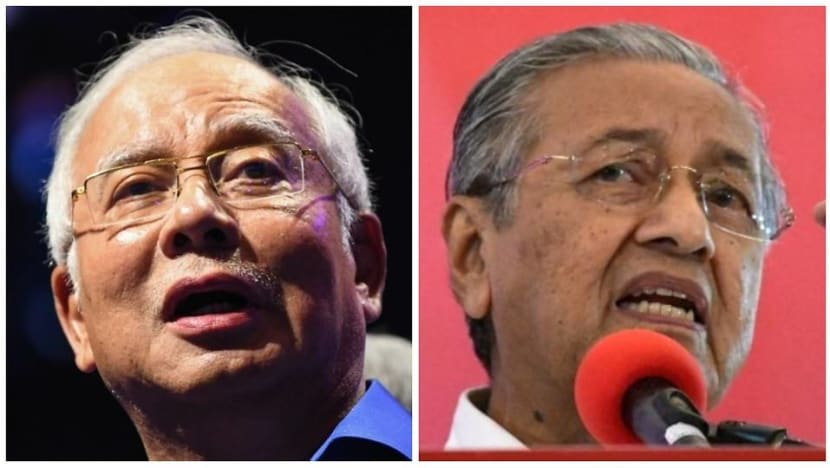Commentary: What if Johor elections are Mahathir’s last?
The upcoming polls are a big gamble for Tun’s party Pejuang. Their political fate hangs in the balance, says James Chin.

Former premier Najib Razak (left) and former Malaysian prime minister Mahathir Mohamad (right). (Photos: AFP)
HOBART: The upcoming Johor State polls on Mar 12 is much more important than most people think.
This is the first election that Malaysians aged 18 to 20 will vote in. It is said that this election will be a barometer for political parties to gauge how the country will vote in the next general elections (GE15), due next year but widely expected to be held later this year.
For one party, the Johor polls can even be described as a matter of “life and death”.
Parti Pejuang Tanah Air (Pejuang), the political party established by Mahathir Mohamad after he lost the prime ministership in 2020, will be contesting 42 out of the 56 seats. This is Pejuang’s electoral debut after it skipped the state elections in Melaka and Sarawak.
A GAMBLE FOR PEJUANG
The conventional wisdom is that if Pejuang fails to get any seats, it is finished at the federal level.
If it wins just a handful of seats and cannot be part of the post-election state ruling coalition, its political future is also gone. It must win at a minimum six seats (or 10 per cent of the Johor seats) in order to be taken seriously.
Unlike other contenders, the entire future of Pejuang rests on the shoulders of one man: Mahathir. There is no other way to describe Pejuang other than it is Mahathir’s party.
In fact, Mukhriz Mahathir, Pejuang’s president acknowledges this. He was quoted as saying on Saturday (Feb 26) that “the spontaneous response when we give them our (campaign) pamphlets is that some go ‘oh this is Tun’s party?’ and it’s across all boards (involving various ethnic groups)”.
There is no one else that can rival Mahathir’s profile in the party. Everyone knows Pejuang is his political vehicle and Pejuang’s main selling point is Mahathir.
In other words, if you liked the country when Mahathir was prime minister, vote Pejuang.
CAN PEJUANG SURVIVE A POST-MAHATHIR ERA?
The big question then is this: In putting all its eggs into a Mahathir basket, can Pejuang survive a post-Mahathir era?
Mahathir is 96. He was admitted into hospital earlier this year, and is still recovering from that episode. Malaysians are coming around to the harsh possibility that Tun, as he is widely known, will not be around in the coming years.
Truth be told, many Malaysians are secretly afraid GE15 may be his last.
It’s hard to see how Pejuang can thrive in a meaningful way post-Mahathir. The party, currently led by his son Mukhriz, may not be taken seriously by the polity once Tun is gone.
People are asking, does Mukhriz have the political skills of his father? Can he command a party that can unseat a government like Mahathir had in 2018?
DOES MAHATHIR HAVE TRACTION WITH JOHOR VOTERS?
But the bigger problem facing Pejuang in making Mahathir its key value proposition is that even now, Mahathir does not “sell” among the non-Malay voters. Many Chinese and Indian voters do not have a fond memory of both terms of his prime ministership.
He was widely credited with strengthening the national philosophy Ketuanan Melayu (Malay Supremacy) during his first term as prime minister from 1981 to 2003 and for failing to honor Pakatan Harapan’s (PH) promises in his second term from 2018 to 2020.
The Chinese were unhappy that he refused in 2020 to recognise the Chinese high school qualification used by over 300 independent schools in Malaysia, called the UEC, despite an explicit pledge to do so in PH’s manifesto. In fact, he had openly said then that the PH manifesto was “not a bible” but merely a “guide”, so why should voters take Mahathir seriously now?
The Mahathir factor also appears to be diminishing among some sections of Malay voters, especially younger ones. Many are coming around to the view that Malaysia’s political instability for the past several years, resulting in three regime changes (2018, 2020, 2021) can be linked directly to Mahathir.
Mahathir had played a key role in Barisan Nasional's (BN) defeat in 2018 and it was his sudden, unnecessary, resignation in February 2020 that triggered the next regime change.
All things considered, the product Pejuang is selling is basically targeted at hardcore Mahathir supporters. They hope this group can be found in the many Federal Land Development Authority (Felda) settlements in Johor, where farmers benefitted from schemes making them smallholders of rich palm oil lands since the late 1950s.
But while these schemes had profited an older generation of Felda settlers who also remember Mahathir at the height of his power in the 1990s, younger Felda farmers have left the settlements and moved to urban areas. Mahathir to them is ancient history.
Moreover, they may be attracted to the new party that specifically targets them – the Malaysian United Democratic Alliance, or MUDA, led by charismatic youth political leader Syed Saddiq.
CAN PEJUANG CREDIBLY CHALLENGE UMNO?
Even if the Mahathir brand sells, the other problem with Pejuang is Mahathir’s campaign theme and his direct, confrontational tactics targeting UMNO.
When the party launched their manifesto last Wednesday, Mahathir had made it clear that Pejuang was focused on quality candidates who are “not involved in corruption and have no interest in getting rich on politics” and expressed confidence that voters who “dislike corruption, dislike shamelessness and dislike the old ways will support us”.
Mahathir was making a glib reference to UMNO leader and former prime minister Najib Razak, who was found guilty of corruption charges in the 1MDB scandal, and to a lesser extent Zahid Hamidi, UMNO’s president, who is also similarly embroiled in a few court cases.
But while Mahathir may think he has found UMNO’s Achilles heel, the trouble is Najib is not standing as a candidate in Johor. Why make him the focus? What if this backfires and puts Pejuang in UMNO’s crosshairs?
UMNO knows this and has moved swiftly to counter Mahathir. Najib, ever the consummate politician, visited a Chinese school in Johor on Friday where he hinted that he had been pivotal to the decision for its construction in 2013 as prime minister and more broadly, when it came to approving licenses for new Chinese schools during his tenure.
The subtext is clear: Najib was signalling that the Chinese community’s interest was best served under UMNO and the wider BN coalition, with him at the helm.
The BN coalition is picking up steam on this narrative. The Malaysian Chinese Association (MCA), the main Chinese party in the BN, in announcing its 15 candidates on Saturday, also used this chance to attack the PH’s record on protecting Chinese interests.
WHAT THE JOHOR ELECTION IS REALLY ABOUT
In fact, Mahathir may be more an impediment than an asset to Pejuang. Many Malaysians increasingly see him as an ambitious, aggressive leader attempting a comeback to ensure that his son Mukhriz is on track to be prime minister in the future.
They blame him for plunging the country into political turmoil. Had Mahathir kept his promise to hand over power to his PH deputy Anwar Ibrahim in 2020, PH would still be in power now, and there would have been political stability.
Mahathir also casts a big shadow. Newer parties like MUDA, Warisan and Parti Bangsa Malaysia are wary of him. They are afraid if they try to enter some sort of alliance with Pejuang, Mahathir would be calling the shots from behind.
So it turns out that while most people think the Johor elections may be a barometer for how youths will vote, it’s more accurate to say it will be a barometer of whether the country is finally ready to turn the corner on a Mahathir-led Malaysia and close that chapter for good.
Johor, the birthplace of UMNO, will determine that.
James Chin is Professor of Asian Studies at the University of Tasmania and Senior Fellow at the Jeffrey Cheah Institute on Southeast Asia.





















